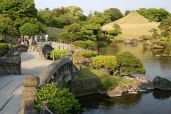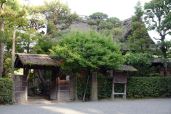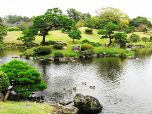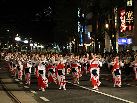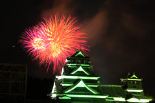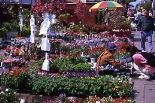History of Kumamoto 熊本の歴史
Due to its pleasant weather, and abundant water supply, Kumamoto has been a site for human settlement for more than twenty eight thousand years. In the ancient times, Kumamoto prefecture was called the Higo Province. Rice cultivation begin during the Yayoi era while the oldest iron axe is also found in Kumamoto. Burial Mounds can be seen all around Kumamoto, while the people living around that time period were called Hinokimi. In 1869, the Higo Province was replaced with the name"Kumamoto", and all lands were to be returned to the Emperor. Not everyone was pleased with this change, and thus the Satsuma Rebellion was brought up. Though the peasants tried to take over Kumamoto castle, they failed to do so and were defeated at the Battle of Shiroyama.
Kumamoto Castle 熊本城
Kumamoto castle is a Japanese castle built on a hilltop and also one of the most well preserved castles in Japan. It offers the visitors a complete castle experience in Japan. Within the castle prefecture, 800 cherry trees were inplanted and the castle has become a famous cherry blossom spot. The construction of the castle took seven years , and it was designed by an experienced worrier, Kato Kiyomasa. There are two castle keeps, the main tower with six stories and the small tower with four stories.
Access Information(Access map provided in photo gallery below):
10 minute, 150 yen tram ride from JR Kumamoto Station
30 to 45 minute walk from Kumamoto Station
Address: 1-1 Honmaru-machi, Kumamoto-shi
Tel: 096-352-5900
Opening hours: 8:30~18:00(April to October 8:30~17:00(November to March)
Admission Fee: Adult- 500 yen Children- 200 yen
Link to homepage: http://www.manyou-kumamoto.jp/castle/
More information: http://www.japan-guide.com/e/e4501.html
Aso Shrine 阿蘇神社
Aso Shrine is a Shinto Shrine located in Aso, Kumamoto Prefecture, Japn. Aso shrine is one of the oldest and prominent shrines in Japan. The Shrine is built to worship the accession of Emperor Jinmu. The Shrine is also famous for its impressive two story Romon Gate, which is one of Japan's three largest gates. A pine tree is located in the shrine that is believed to bring luck to marriage.
Access Information: A 20 minute walk north from Miyaji station on the JR Hohi LIne.
Address: 熊本県阿蘇市一の宮町宮地3083-1
Tel: 0967-22-0064
More information: http://www.japan-guide.com/e/e4553.html
Suizen-ji Jōju-en 水前寺成趣園
Suizen-ji Joju Garden is a stroll garden built by Hosokawa clan feudal lords of Edo period. Suizenji Jojuen features miniature version of the scenic views along the famous "Tokaido" Road, which connected present-day Tokyo with Kyoto. Built originally in Kyoto, the tea room and a study room for Prince Katsura Tomohito, the tea house is reloacted in 1912, and many agreed that the garden looks best when viewed from the tea house.
Access information: 3-minute walk from Suizenji Koen-mae bus stopor Suizenji Koen-mae Kenritsu Toshokan Iriguchi bus stop
Address: Suizenji Koen 8-1, Kumamoto city, Kumamoto prefecture 860-0956
Tel: 096-383-0074
Opening hours: Mar. - Oct.: 7:30 a.m. - 6:00 p.m.(Last admission 5:30 p.m.)
Nov. - Feb.: 8:30 a.m. - 5:00 p.m.(Last admission 4:30 p.m.)
Admission Fee: Adult(High school and up) 400 yen
Children(Junior high school and elementary school) 200 yen
Kumamoto's culture
Linke many other prefectures in Kyushu, many traditional festivals that has over 400 years of history are held in varies cities in Kumamto. The most famous being the Yakushi Festival, Hinokuni Festival and the Fujisaki Hachimangu Shrine Grand Festival.
Hinokuni Festival 火の国まつり
Hinokuni festival is the biggest festival held in Kumamoto. On the day of the festival, thousands of citizens and foreigners dance on the streets of the city. Hinokuni, means Country of Fire, the festival is held annually from August 11th to 13th. The dance celebrates Kumamoto as the land of fire as the dancers dance the traiditonal Otemoyan Grand dance.
Tel: 096-334-1500
Link to homepage: http://www.hinokunimatsuri.jp/
For more information: http://kumanago.jp/en/events/detail/430000003540.html
Mount Aso 阿蘇山
Mount Aso is one of the largest active volcano in the world. The first eruption occured around 300,000 years ago while the last eruption occured in 2011. It is among one of the most popular tourist spots as visitors are allowed to view the different and diverged forms of the crater.
Access information:From Aso train station is a 40 minute bus ride
Tel: 0967-32-1960
Opening hours: 8:30~16:25
More information:http://www.jnto.go.jp/eng/location/regional/kumamoto/aso.html
Fujisaki Hachiman-gū 藤崎八幡宮
Fujisaki Hachiman-gu is a shinto shrine dedicated to Emperor Ojin, Empress Jingu and Sumiyoshi Sanjin.The Shrine was founded in 935 AD, and many well-known festivals are held in the Shrine. The most popular being the Autumn Festival of Fujisaki Hachimangu and the Parade of Kami with horses.
Access Information: From Kumamoto JR Station, take the bus from Kumamoto Bus center to Fujisakigumae station (15 minute), then walk for 5 minutes.
Address: Igawabuchi-machi, Chūō-ku,Kumamoto Kumamoto 860-0841
Tel: 096-343-1543
Opening hours: 8:30~17:00
Link to homepage: http://www.fujisakigu.or.jp/
Yakushi Festival
The Yakushi festival is held annually from May 8th to May 10th. Popular garden plant market is said to continue from the Edo era and is called one of the Japan's three biggest garden plant markets along with garden plant market of Kumamoto-shi, Osaka-shi.
Access Information:
A 10 minute walk from Yamagata Station
Address: 2-12-32, Yakushimachi, Yamagata-shi
Tel: 023-622-4666
For more information, please visit:
http://yamagatakanko.com.e.db.hp.transer.com/eventdetail/?data_id=3110









